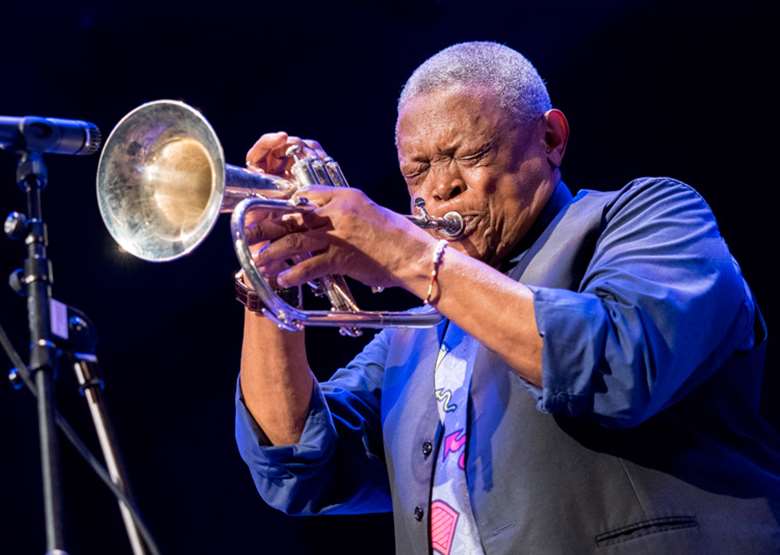Hugh Masekela (04/04/1939 – 23/01/2018)
Tuesday, January 23, 2018
As South Africa continues its development in the post-apartheid era the courage of those who used music to alert the world to the brutal inhumanity of the old order is as important as ever.

Hugh Masekela, who has died at the age of 78, was really a national institution, a talented trumpeter, vocalist and songwriter who, like his ex-wife Miriam Makeba, was boldly outspoken on the large scale human rights abuses perpetrated in his homeland over a number of years, during which time he endured the vagaries of exile in the west and covered an enormous amount of musical ground.
Born in Witbank, Johannesburg, Masekela was greatly inspired by American icons Louis Armstrong, Cab Calloway, Dizzy Gillespie and Duke Ellington as well as the richness of South African choral music and urban dance styles like kwela during his youth. Encouraged to forge his own path by the Anglican priest and anti-apartheid activist Trevor Trevor Huddleston, Masekela became part of the wave of post-war South African jazz musicians that included Jonas Gwangwa, Kippie Moeketsi and Dollar Brand [latterly Abdullah Ibrahim]. In the late 1950s they collectively formed the Jazz Epistles, a legendary ensemble that showed Maskela’s early promise as an improviser in a Blakey-esque hard bop setting, and also contributed to the eclectic music of the internationally successful township-based musical King Kong.
As the situation in South Africa dramatically worsened, following the heinous Sharpeville massacre of 1960, Masekela and other musicians had little option but to leave the country. The trumpeter emigrated to New York, where he won a scholarship to study at the Manhattan School of Music, and started his career as an international artist in earnest, enjoying the friendship and patronage of high profile Civil Rights activists such as Harry Belafonte. In the decades that followed Masekela trod an intriguing path between jazz, African music and soul-inflected pop, recording critically acclaimed albums such as Trumpet Africa and enjoying worldwide commercial success with the irresistibly catchy hit ‘Grazin’ In The Grass.’
Masekela’s life, in any case, was anything but a stroll in the park. His marriage to Miriam Makeba collapsed amid the pressures of celebrity, his friendship with counter culture icons such as Stephen Stills attracted the attention of the FBI, and his longing for South Africa took an emotional toll. As he told me when I first interviewed him in the millennium he went through a period where it was difficult to manage the ‘burning anger’ he felt about apartheid. Admirably, he channelled his emotions in various ways. On the one hand there was superlative improvising on sessions such as Home Is Where The Music Is, an incisive comment about his nomadic status that united him with his equally illustrious compatriot, alto saxophonist Dudu Pukwana and American pianist Larry Willis. On the other there was highly progressive dance music such as the sophisticated Afro-electro funk of ‘Don’t Go Lose It Baby’, a huge club track in the 80s that found favour with the ‘soul boy’ crowd as well as lovers of African music excited by its wily blend of live playing and programming.
Masekela co-wrote the score for the Broadway musical Sarafina! and eventually returned to Mandela’s South Africa in the ‘90s. His role as an elder statesman, mentor and teacher became increasingly prominent but he still found time to regularly tour internationally, forming a popular duo with Willis, making a fine appearance at the London jazz festival in 2013. What was even more impressive was the Steve Biko Memorial lecture Maskekela gave at the London School Of Economics the following year. To hear him play flugelhorn and sing unaccompanied in a crowded lecture theatre was totally spellbinding, especially when he performed ‘Stimela’ [Coal Train], the heart-breaking ballad for migrant workers in South African mineral mines.
What moved the audience even further was the moment Masekela said that when an individual rises from disadvantaged circumstances and achieves any measure of success it is essential that they give something back to the community whence they came. There was a sharp intake of breath in the room, not simply because of the integrity of the statement. It was more the realisation that Masekela had been true to his word. He continued to shoulder that responsibility until the very end of his life.
– Kevin Le Gendre
– Photo by Tim Dickeson